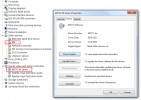I seriously doubt the third revision will have official driver support for Windows 7 either. Why would MOTU support Win7 when even MS doesn't support it anymore?
Don't like modern Windows and where it's headed? Ditch Windows already and switch to another OS entirely.
With that said, I think it may be possible to get rev2 and rev3 working under Windows 7 by
editing .inf files and disabling driver signature enforcement (or using test mode and self-signing the driver, or paying to get a signature accepted by Win7 without special boot options).
I could get the driver to load for my M4 (which is either rev2 or rev3) in Win7, but no audio ever came out of it. However, I was testing in a virtual machine and I couldn't get any audio out of it under Win10 running inside a VM either. Perhaps if Win7 had been running on bare metal it'd have worked.
I'm not really interested in testing Win7 on bare metal myself, at least not right now or in the near future, too much time and effort required, but maybe someone else could do it.
edit: actually just disabling signatures is enough to load MOTUCoreUAC.sys under Win7. Some time has passed since I was playing around with this... (I also tried to use the old rev1 only driver which only has USB IDs listed in .inf for the old hardware but is officially Win7 compatible and it got blurred together with experimenting with the newer drivers in my memories)
View attachment 193662
I don't know what the unknown device labeled "M4" under "Other devices" is about, it has the exact same IDs as the actual audio device. No audio is coming out despite me playing a .wav file in WMP. I can't be bothered to test whether MIDI would actually work. Sometimes Windows also gets really slow when using the audio config control panel applet. These could very well be VM USB problems only though.
Can you still even get new drivers for Win7 signed? Something to consider before blaming hardware vendors for not supporting Win7 anymore is that Redmond clearly doesn't want anyone to support it.

